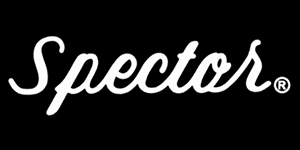
A small New York company producing the highest quality instruments for musicians of any level. Spector has always been distinguished and defined by its beauty, unusual materials and forms of its guitars and basses.
Brief history/technical and technological achievements:
Spector company was founded in 1977 by Stuart Spector and his friends from the Brooklyn Woodworkers Co-op.
Inspiration can hit you in any way. Stuart Spector was inspired by banjo. "One day in 1974 I was sitting in my friend Mike Kropp’s apartment," recalls Spector. "Mike is a fabulous banjo player, and he was playing a pre-war Gibson ‘hearts & flowers’ Mastertone flathead banjo. I’m listening to him play and thinking, Wow, that’s a beautiful banjo. And Mike says, ‘It’s not the original neck—it’s a reproduction made by my college friend, Kix Stewart.’ Mike tells me that Kix—who’s now the Stewart of Stewart-MacDonald’s Guitar Shop Supply—had made the neck in about a week and spray-painted it in his bathroom. I heard this story and thought, Well, if he can do that, I can make a guitar or a bass."
Soon after, Stuart, who lived in a Brooklyn apartment, decided to open a store. He fastened the workbench to the wall in his bedroom, bought some tools at the hardware store. He bought wood in H. L. Wild & Company, they sold parts for guitars in the depths of the eastern suburbs. It was this incredibly old store and if you wandered there you could find anything.
Spector decided to start manufacturing instruments – his good financial situation conduced to business creating. He felt that he could build something that he couldn’t afford because of the price. There were no books or manuals for making electric guitars or basses, so Stuart was learning by trial and error - with little help from his friends. When he was making his first instrument someone told him about the guys in the neighborhood who had a wood shop, he went there and met Billy Thomas, who became one of his closest friends. An experienced carpenter who also played guitar and bass, Billy became interested in what Stuart was doing and offered to teach Spector how to handle woodworking equipment without crippling himself - Thomas was very proud to inherit the occupation of a carpenter from his grandparents.
Soon Spector completed his first bass: one-piece maple neck and a body made of Paducah and Mahogany. A brass coil pickup and an ebony bridge.
When Billy Thomas and some of his colleagues rented an attic in an old factory building to form a Brooklyn Woodworkers Co-op, Spector rented a place there and got down to a serious business. Ultimately he had enough courage to go to 48th Street and show Bernie Gracin his bass in Gracin & Towne Music, he said he could sell Stuart’s instrument. Bernie paid him $450. Encouraged by his first commercial success, Stuart created a cooperative with a former furniture assembler, Alan Charney, and entered the business as Spector Guitars. His first employee was a newcomer to the instrument manufacturing world, his name was Vinny Fodera.
In 1976 Spector and his friends from the cooperative visited a shop where a woodworking machine was put for sale. The same year Ned Steinberger came. Ned moved to them and began to design and assemble furniture. He was fascinated by the idea that they were abnormal enough to make musical instruments, and he said that he thought he could design a bass guitar, Stuart told him that he could join them. Ned was back a week later with the first version of the "NS carved-body bass" which still hasn’t been discontinued.
Introduced in 1977, "NS" quickly put all the pros in its favor. Spector has offered many different versions, but focused on the sound and convenient, unusual shape of the body.
The demand for "NS" went off scale, Spector Guitars developed rapidly, and in 1985 Kramer acquired the company. Stewart took on the role of a consultant, and the Spector-by-Kramer basses were put into production. After Kramer went bankrupt, Stuart made basses sporting SSD logo. In 1998 he won a legal battle to return Spector trademark. Today Stuart makes 8-10 bass guitars a month at his store in the wilds of New York, and he also offers instruments produced in the Czech Republic, Korea, and China, according to the contract. Stuart says that they are their own, small, native, transnational corporation.
One of Spector's latest offers is a reborn old model. They again presented USA bolt-on NS bass. This project has a through neck first made in 1981. With the technologies now available they can accept an order at a relatively reasonable price. Now they are doing about 20 guitars a month.
He believes that they make the best electric bass guitars in the world. Masters from all over the world make their instruments with great love and care. The company has basses for every wallet, from entry-level Performance Series guitars to brand top-line USA Series which is handcrafted here in the wilds of New York. When you choose Spector Bass, you decide to buy a bass which would serve for ages. And Stuart Spector is right.

